| Pages:
1
..
60
61
62
63
64
..
77 |
Sulaiman
International Hazard
    
Posts: 3741
Registered: 8-2-2015
Location: 3rd rock from the sun
Member Is Offline
|
|
Slugs and snails were abundant in the garden when we moved in to this house.
the best way to get rid of them is to collect them during wet dark hours,
but beer traps work.
A half-full container of beer attracts slugs in, and they drown ...
after a few days the trap stops working and needs fresh beer,
which is why I stopped using this method,
as I'm not allowed alcohol myself, I'm definitely not treating my enemy to two free beers a week.
|
|
|
DraconicAcid
International Hazard
    
Posts: 4380
Registered: 1-2-2013
Location: The tiniest college campus ever....
Member Is Offline
Mood: Semi-victorious.
|
|
Why not? That way they'll be damned as well as dead.
Please remember: "Filtrate" is not a verb.
Write up your lab reports the way your instructor wants them, not the way your ex-instructor wants them.
|
|
|
Abromination
Hazard to Others
  
Posts: 432
Registered: 10-7-2018
Location: Alaska
Member Is Offline
Mood: 1,4 tar
|
|
Quote: Originally posted by The Volatile Chemist  | | Abromination, that's a nice little collection going there. I like the vials you're using there - not quite 'chemistry lab spec' but I think they give
the collection a nice look - good photo. |
Thanks! I got them from a special store called "The Natural Pantry." It has a DIY section for making plant salves and stuff. I saw these vials for
making lip balm and thought they would be perfect for vials. They are quite small (and not cheap) buy I got nine of them in a package and they are
perfect for displaying chemicals. The bottle was also from Natural Pantry and the vial of copper was full of sand (which I dumped out) when I was on
my schools symphonic band's trip in California.
I just made copper oxide and I also have copper tannate from tea, although there isnt enough to fill even a quarter vial.
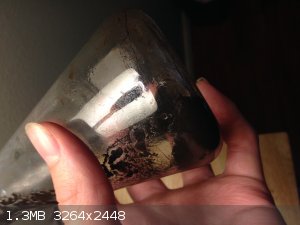 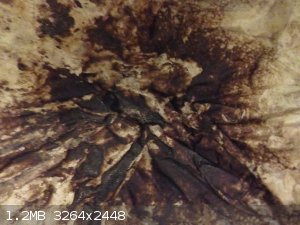
List of materials made by ScienceMadness.org users:
https://docs.google.com/spreadsheets/d/1nmJ8uq-h4IkXPxD5svnT...
--------------------------------
Elements Collected: H, Li, B, C, N, O, Mg, Al, Si, P, S, Fe, Ni, Cu, Zn, Ag, I, Au, Pb, Bi, Am
Last Acquired: B
Next: Na
-------------- |
|
|
nimgoldman
Hazard to Others
  
Posts: 304
Registered: 11-6-2018
Member Is Offline
|
|
UV fluorescence of beta-carbolines harmine and dihydroharmine (harmaline) extracted from P. harmala
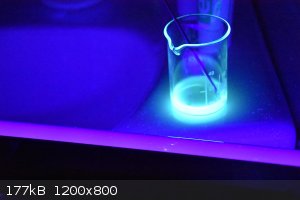
|
|
|
The Volatile Chemist
International Hazard
    
Posts: 1981
Registered: 22-3-2014
Location: 'Stil' in the lab...
Member Is Offline
Mood: Copious
|
|
That's crazy - Never heard of that. Was it done in a professional lab?
|
|
|
nimgoldman
Hazard to Others
  
Posts: 304
Registered: 11-6-2018
Member Is Offline
|
|
No the fluorescent harmala alkaloids, namely harmine and harmaline, have been extracted from Peganum harmala seeds. It's a simple A/B extraction
followed by recrystallization from brine. It can be done at home lab.
I have also isolated harmaline and sythesized tetrahydroharmine hydrochloride based on this paper - tetrahydroharmine glows faintly blue under UV (see picture - I have used it as a eco friendly dye for body painting on a party  ). ).
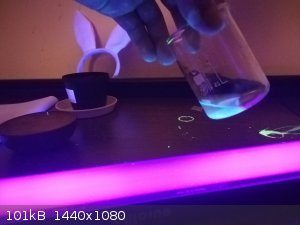
[Edited on 6-9-2018 by nimgoldman]
|
|
|
Heptylene
Hazard to Others
  
Posts: 319
Registered: 22-10-2016
Member Is Offline
Mood: No Mood
|
|
Donut reaction
I made some 4-amino-5-nitrosouracil recently, by nitrosation of 4-aminouracil with NaNO2/AcOH. The product precipitated and made a nice pink slurry
that looked like a glazed donut 
The preparation of the compound is given here (german), as an intermediate in the synthesis of caffeine. Btw the site is a great resource for amateur organic chemistry.
The reaction:
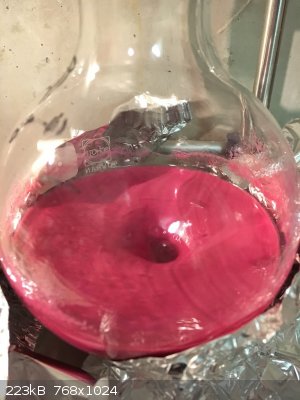
A typical donut:
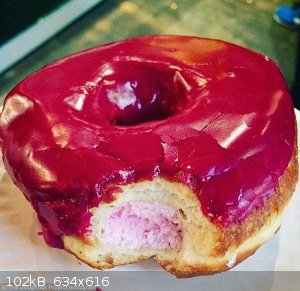
|
|
|
SWIM
National Hazard
   
Posts: 970
Registered: 3-9-2017
Member Is Offline
|
|
Quote: Originally posted by nimgoldman  |
No the fluorescent harmala alkaloids, namely harmine and harmaline, have been extracted from Peganum harmala seeds. It's a simple A/B extraction
followed by recrystallization from brine. It can be done at home lab.
I have also isolated harmaline and sythesized tetrahydroharmine hydrochloride based on this paper - tetrahydroharmine glows faintly blue under UV (see picture - I have used it as a eco friendly dye for body painting on a party  ). ).
[Edited on 6-9-2018 by nimgoldman] |
Any central effects from all that skin contact?
If so, I hope they weren't serving Fava bean dip at that party.
|
|
|
Abromination
Hazard to Others
  
Posts: 432
Registered: 10-7-2018
Location: Alaska
Member Is Offline
Mood: 1,4 tar
|
|
Thought this was kind of cool, its the solvent extraction of chlorophyll from willow bark.
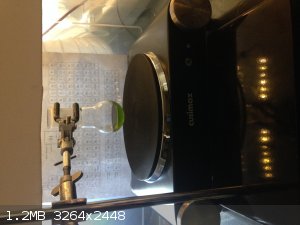
List of materials made by ScienceMadness.org users:
https://docs.google.com/spreadsheets/d/1nmJ8uq-h4IkXPxD5svnT...
--------------------------------
Elements Collected: H, Li, B, C, N, O, Mg, Al, Si, P, S, Fe, Ni, Cu, Zn, Ag, I, Au, Pb, Bi, Am
Last Acquired: B
Next: Na
-------------- |
|
|
Heptylene
Hazard to Others
  
Posts: 319
Registered: 22-10-2016
Member Is Offline
Mood: No Mood
|
|
Try to shine long wave UV light on that chlorophyll solution: you'll get a very nice red fluorescence. Speaking of fluorescence I tried some
europium(III) oxide recently:
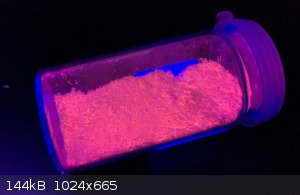
|
|
|
nimgoldman
Hazard to Others
  
Posts: 304
Registered: 11-6-2018
Member Is Offline
|
|
Quote: Originally posted by SWIM  | Quote: Originally posted by nimgoldman  |
No the fluorescent harmala alkaloids, namely harmine and harmaline, have been extracted from Peganum harmala seeds. It's a simple A/B extraction
followed by recrystallization from brine. It can be done at home lab.
I have also isolated harmaline and sythesized tetrahydroharmine hydrochloride based on this paper - tetrahydroharmine glows faintly blue under UV (see picture - I have used it as a eco friendly dye for body painting on a party  ). ).
[Edited on 6-9-2018 by nimgoldman] |
Any central effects from all that skin contact?
If so, I hope they weren't serving Fava bean dip at that party. |
Nope, it's not absorbed through the skin and even if it was, given the dilution factor the dose would be in the range of tens of micrograms, really
not something to MAO enzymes (even the oral dose must be huge to fully inhibit MAO).
We just made few dots and lines here and there 
|
|
|
Abromination
Hazard to Others
  
Posts: 432
Registered: 10-7-2018
Location: Alaska
Member Is Offline
Mood: 1,4 tar
|
|
I shined some UV light on it and it dimly flouresed red but it wasnt much. I don't think the light I was using was quite the right frequency though,
it was only a few bucks.
List of materials made by ScienceMadness.org users:
https://docs.google.com/spreadsheets/d/1nmJ8uq-h4IkXPxD5svnT...
--------------------------------
Elements Collected: H, Li, B, C, N, O, Mg, Al, Si, P, S, Fe, Ni, Cu, Zn, Ag, I, Au, Pb, Bi, Am
Last Acquired: B
Next: Na
-------------- |
|
|
Sulaiman
International Hazard
    
Posts: 3741
Registered: 8-2-2015
Location: 3rd rock from the sun
Member Is Offline
|
|
My 'new' 14/23 thermometer
Maybe not a particularly pretty picture to most, but it is to me
my old 10/19 (0 to 250 x 2oC) thermometer
next to my 'new' 14/23 (-10 to +350 x 1oC) thermometer

(the readings are different due to environmental changes)
Thanks to DrScrabs
I can now get on with Hg and H2SO4 and kerosene distillations at atmospheric pressure.
(I previously needed a thermocouple in a thermometer pocket/well/adapter, which is OK,
but I like the look of 'real' thermometers,
even though more expensive and less useful)
I have not checked the calibration of the 14/23 thermometer yet.
|
|
|
Jackson
Hazard to Others
  
Posts: 189
Registered: 22-5-2018
Location: U S of A
Member Is Offline
Mood:  Happy about new glassware 
|
|
This is a picture of a sulfur containing mineral I found while walking on the beach. I was looking at the cliff and noticed a large vein of this brown
rock with sulfur in it.
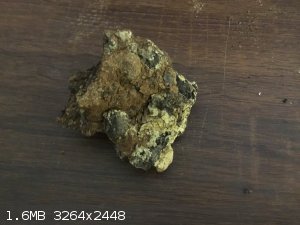
|
|
|
MrHomeScientist
International Hazard
    
Posts: 1806
Registered: 24-10-2010
Location: Flerovium
Member Is Offline
Mood: No Mood
|
|
Quote: Originally posted by Abromination  |
I shined some UV light on it and it dimly flouresed red but it wasnt much. I don't think the light I was using was quite the right frequency though,
it was only a few bucks. |
If your solution was in a regular glass flask, the glass probably blocked most of the UV. Try shining it directly on the liquid, or using quartz glass
(if you have any).
|
|
|
TheMrbunGee
Hazard to Others
  
Posts: 364
Registered: 13-7-2016
Location: EU
Member Is Offline
Mood: Phosphorising
|
|
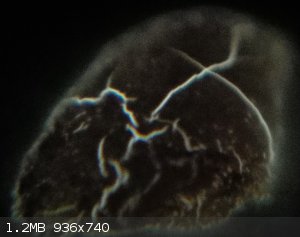
VIDEO!
|
|
|
weilawei
Hazard to Others
  
Posts: 130
Registered: 3-12-2017
Member Is Offline
Mood: No Mood
|
|
I needed more nitric acid to continue my experiments with plating, so I've got the still going. Noticed KNO2 and KNO3 precipitating out of the hose
leading to my scrubber (traces of KOH solution in the hose used to load the scrubber).
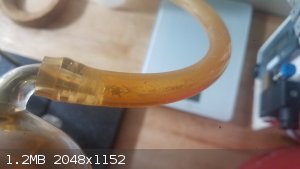
Jackson, that's a nice looking specimen there! Congrats on the find. Do you live in a volcanic area?
[Edited on 26-9-2018 by weilawei]
|
|
|
Jackson
Hazard to Others
  
Posts: 189
Registered: 22-5-2018
Location: U S of A
Member Is Offline
Mood:  Happy about new glassware 
|
|
Quote: Originally posted by weilawei  |
Jackson, that's a nice looking specimen there! Congrats on the find. Do you live in a volcanic area?
[Edited on 26-9-2018 by weilawei] |
The area is Geothermally active with hot springs.
|
|
|
MrHomeScientist
International Hazard
    
Posts: 1806
Registered: 24-10-2010
Location: Flerovium
Member Is Offline
Mood: No Mood
|
|
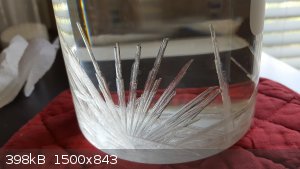 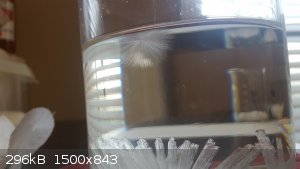
Recrystallizing some ammonium nitrate from solution in tap water. I used this as a demonstration of temperature change, by "dissecting" cold packs,
for students, and throwing it away seemed like a terrible waste. 
I've been steadily boiling off the water and the solution gradually turns yellow for some reason. I also notice cubical crystals starting to grow on
top of the nice long rods:
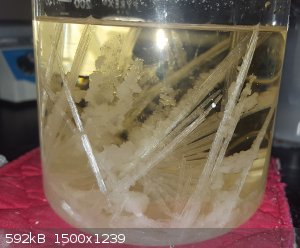
What are those? Does ammonium nitrate have several different crystal habits (is that even possible?)? I wouldn't think tap water has enough impurities
to make so many large crystals.
|
|
|
Sigmatropic
Hazard to Others
  
Posts: 307
Registered: 29-1-2017
Member Is Offline
Mood: No Mood
|
|
Did you boil off the water in a metal pan? If so I believe the yellow color is from Fe3+. No idea what the cubical crystals are but can confirm it
crystallizes as needles from a hot solution. Perhaps try to crystallize some by slow evaporation at RT, it might be a hydrate which only crystalizes
belowa certain temperature (as with citric acid for example).
|
|
|
MrHomeScientist
International Hazard
    
Posts: 1806
Registered: 24-10-2010
Location: Flerovium
Member Is Offline
Mood: No Mood
|
|
No, it was all done in glass. It's possible there was iron in the tap water that's been concentrated; I started with something like 16 liters of
solution, and am now down to about 3. All those pictures were crystals from cooling off of hot solution - I stopped boiling, filtered into a new
container, let sit to cool, and the crystals grew. I could take a sample of the now-saturated solution to evaporate it and see what it does.
|
|
|
Jackson
Hazard to Others
  
Posts: 189
Registered: 22-5-2018
Location: U S of A
Member Is Offline
Mood:  Happy about new glassware 
|
|
Some sulfur i recrystalized from garden sulfur.
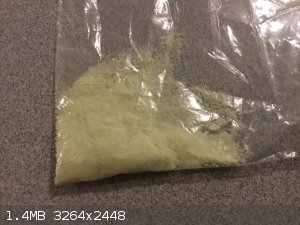
|
|
|
greenlight
National Hazard
   
Posts: 761
Registered: 3-11-2014
Member Is Offline
Mood: Energetic
|
|
Not really chemistry but still interesting to look at. Some still pics I found on an old device from when I started making larger aerial shells and
was experimenting with the top-fusing method.
The quickmatch fuse lights the delay on the top of the shell in the first pic which in turn lights a second piece of quickmatch piped down the side of
shell and ignites what would be the lift charge in the second photo.
[Edited on 15-10-2018 by greenlight]
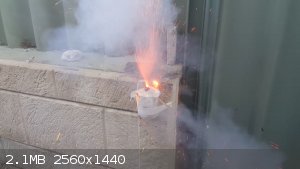 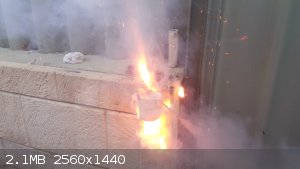
|
|
|
weilawei
Hazard to Others
  
Posts: 130
Registered: 3-12-2017
Member Is Offline
Mood: No Mood
|
|
A small amount of bromine in aqueous solution.
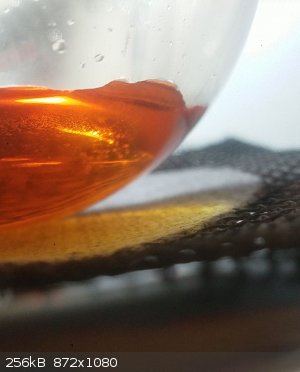
|
|
|
Gooferking Science
Hazard to Self
 
Posts: 97
Registered: 17-7-2013
Location: Somewhere in Kansas, USA...
Member Is Offline
Mood: Halogenated
|
|
Freshly deposited iodine crystals.
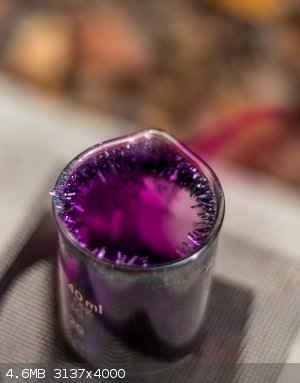
|
|
|
| Pages:
1
..
60
61
62
63
64
..
77 |